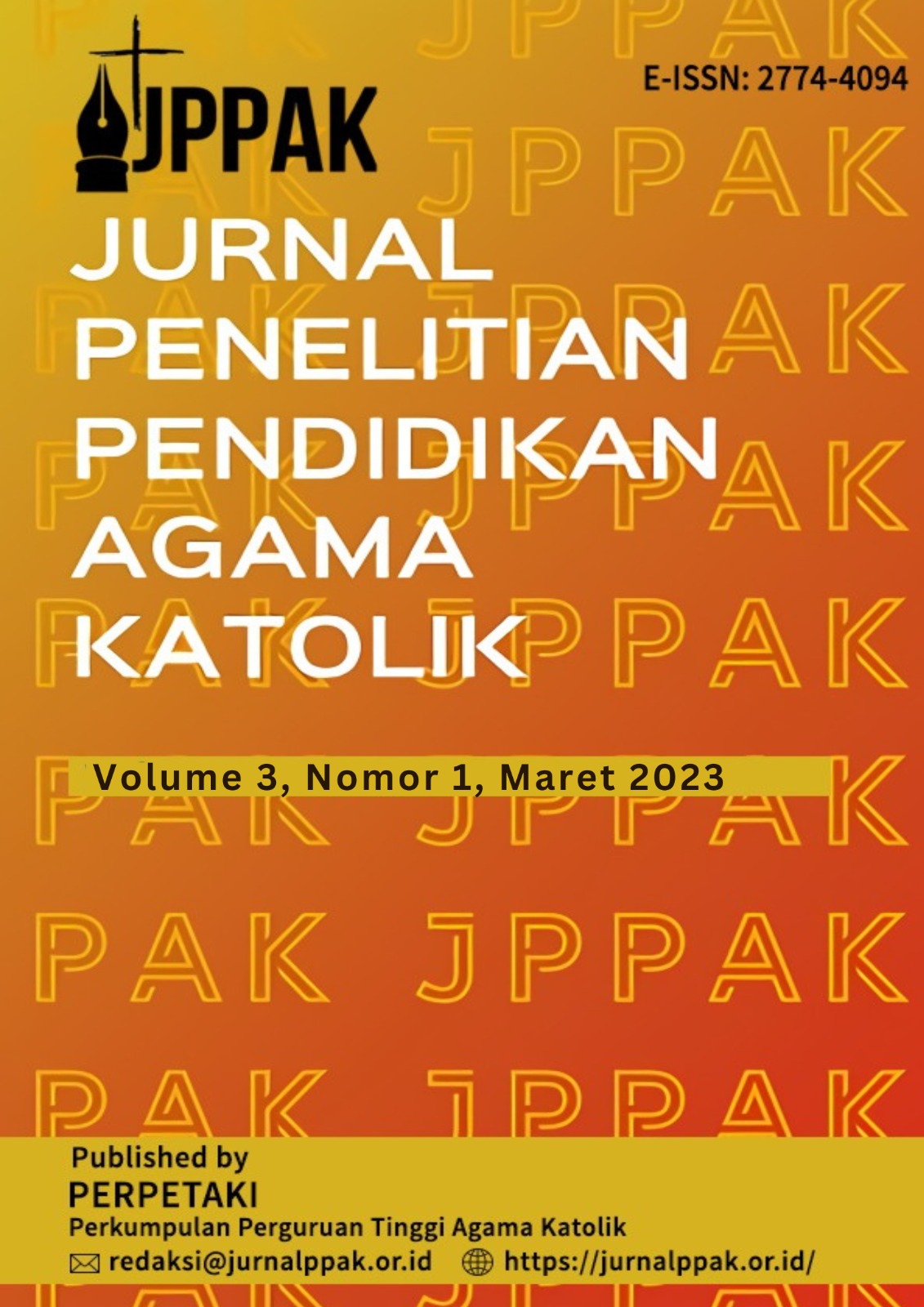Learning Model in Catholic Religious Education (PAK) at the Junior High School Education Level (SMP) in Pontianak City
DOI:
https://doi.org/10.52110/jppak.v3i1.64Keywords:
model, mapping, teaching, learning, PAK, evaluation, identificationAbstract
The diversity of paradigms and learning models is aimed to fulfill the needs of students. Learning materials need to be adapted according to the needs that are increasing from day to day. This study aims to explore and identify various teaching and learning models that are applied by Catholic Religious teachers at the junior high school level in Pontianak Municipality. It includes, first, the teaching and learning that are practiced by Catholic Religious Education (CRE) teachers; second, the various constraints experienced by CRE teachers in implementing the learning models; third, the extent of the students’ needs for CRE teaching and learning specifications. The study was conducted on 6 junior high schools, consisting of 5 state schools and 1 private Catholic. Primary data is collected by interview techniques. Through the interview technique, the researcher obtained information from
informants (teachers, students, and other related parties). Interviews were conducted in a semi-structured, assisted by an interview guide as a data collection tool without limiting the number of questions. Informants were selected purposively. In this study, Focus Group Discussion was also conducted as a forum for discussion and debriefing for CRE teachers in deepening their insight into the models. The study shows that the models are dominated by the cooperative model; while the constraints for the utilization of the models are the lack of facilities and the evaluation from the CRE teachers towards the learning models.
Downloads
##submission.downloads##
Submitted
Accepted
Published
How to Cite
Issue
Section
License
Copyright (c) 2023 Gustaf Hariyanto, Florentinus Sutami, Kristina Laora, Aldi Alfrianza Sinulingga

This work is licensed under a Creative Commons Attribution-ShareAlike 4.0 International License.
Copyright Notice and Permissions
Jurnal Penelitian Pendidikan Agama Katolik offers immediate open access to all its content on the principle to make researches freely available to the public, especially to the scholars, to support greater global exchanges of knowledge. This journal encourages all scholarly authors to allow their research openly available, free access and without time restrictions.
All articles published Open Access will be immediately and permanently free for everyone to read and download. Under the CC BY-SA 4.0 license, authors retain ownership of the copyright for their article, however authors grant others permission to use the content of publications in Jurnal Penelitian Pendidikan Agama Katolik (JPPAK) in whole or in part provided that the original work is properly cited. Users (redistributors) of Jurnal Penelitian Pendidikan Agama Katolik (JPPAK) are required to cite the original source by including at least: the full title of the article, the author's or authors' full name(s), JPPAK as the initial source of publication, year of publication and volume number using a propriate citing method.
Copyright encompasses exclusive rights to reproduce and deliver the article in all form and media, including reprints, photographs, microfilms and any other similar reproductions, as well as translations. The reproduction of any part of this journal, its storage in databases and its transmission by any form or media, such as electronic, electrostatic and mechanical copies, photocopies, recordings, magnetic media is prohibited without consent of Jurnal Penelitian Pendidikan Agama Katolik (JPPAK).
Jurnal Penelitian Pendidikan Agama Katolik (JPPAK) is licensed under a Creative Commons Attribution Share-Alike 4.0 International. (CC BY-SA 4.0)
Authors who publish with Jurnal Penelitian Pendidikan Agama Katolik (JPPAK) agree to the following terms:
- Authors retain copyright and grant the journal right of first publication with the work simultaneously licensed under a Creative Commons Attribution Share-Alike 4.0 International (CC BY-SA 4.0) license that allows others to share the work with an acknowledgement of the work's authorship and initial publication in this journal.
- Authors are able to enter into separate, additional contractual arrangements for the non-exclusive distribution of the journal's published version of the work (e.g., post it to an institutional repository or publish it in a book), with an acknowledgement of its initial publication in this journal.
- Authors are permitted and encouraged to post their work online (e.g., in institutional repositories or on their website) after the publication on JPPAK, as long as it not published on other OJS for it will be treated as plagiarism by plagiarism checker apps. It can lead to productive exchanges, as well as earlier and greater citation of published work (See The Effect of Open Access).












